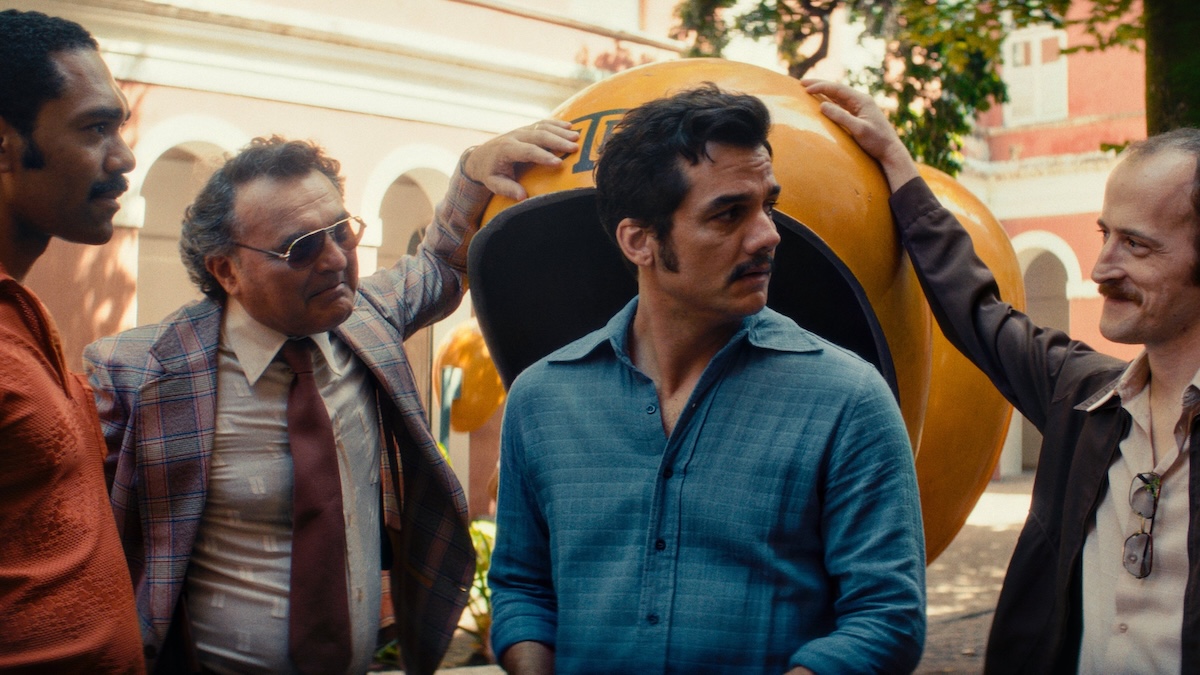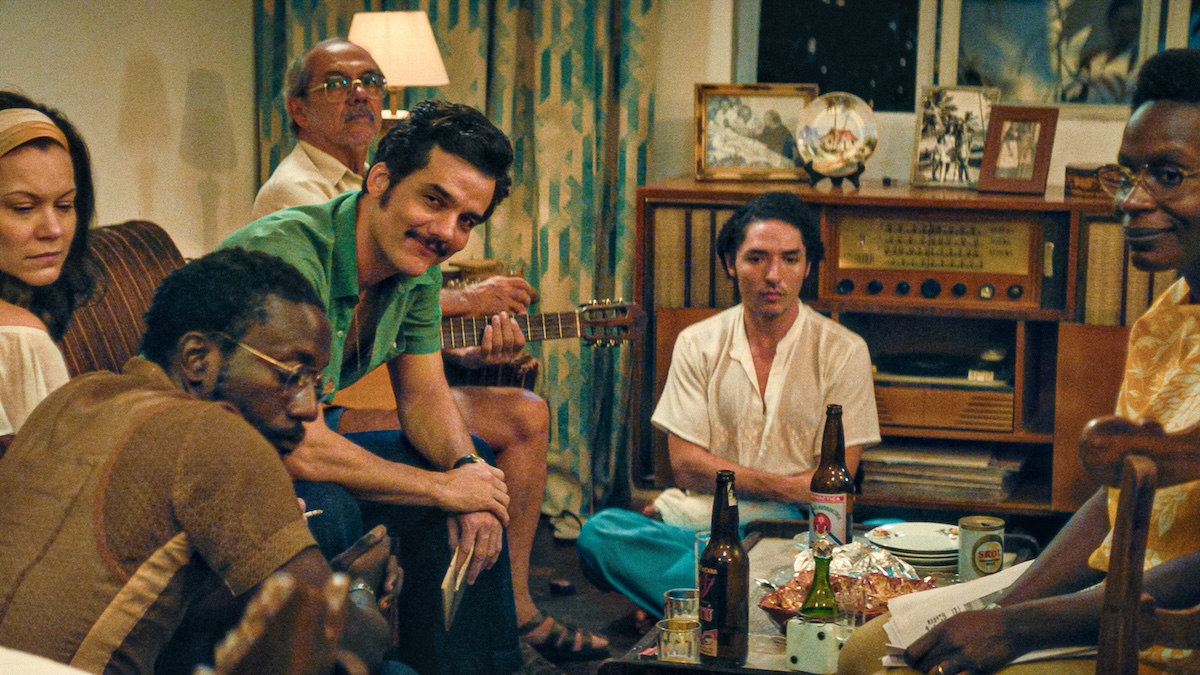THE SECRET AGENT (2025)
In 1977, a technology expert flees from a mysterious past and returns to his hometown in search of peace, but soon realises the city is far from a refuge...

In 1977, a technology expert flees from a mysterious past and returns to his hometown in search of peace, but soon realises the city is far from a refuge...

In our dire present moment, the global rise of authoritarianism seems to be prompting a very specific kind of international historical reflection. In both art and activism, there’s a growing attempt to learn from dictatorial regimes of past eras to find modes of resistance for our modern day, where democracy is repeatedly eroded and violated by the oligarchs seeking to expand their own wealth. The United States faces a despotic, growing disdain for the sanctity of the constitutional rule of law. Russia and China remain consistently potent dictatorial world powers. Echoes of world wars and repressive regimes of decades and centuries past are re-emerging in sharper focus than ever.
But glimmers of hope have emerged from other corners of the world. South Korea only recently resisted the efforts of former President Yoon Seok-yeol to bring the entire country back under the iron fist of martial law, impeaching him and removing him from office—a lesson from the echoes of the agony that martial law brought its people over 40 years ago. And Brazil has only just now jailed former President Jair Bolsonarofor his attempt to overthrow the government after his legitimate electoral removal—a 27-year sentence that not only demonstrates the resilience of the Brazilian people, but also exposes the limits of attempting to upend democracy, for aspirant dictators around the globe to see.
This isn’t Brazil’s first brush with authoritarianism—far from it. 1964 saw the nascent beginnings of a 21-year-long military dictatorship, overthrowing legitimate president João Goulart with the backing of the US, and instigating an era of unmitigated torture, slaughter, and democratic backsliding that the country still reels from to this day. It was a coup endorsed repeatedly by Bolsonaro during his term in office; it was also a dictatorship that exercised its brutalities to the remote city of Recife, a town littered with movie palaces, a hub for culture in Brazil.

In 2023, filmmaker Kleber Mendonça Filho released a documentary called Pictures of Ghosts—an ode to Recife as a location of personal relevance to Filho’s career, and a photo-based elegy to the cinema palaces of the city that closed, all of which house memories that Filho looks back on long after their obsolescence. Long has Filho’s career been a sort of self-reflexive tribute to the way that cinema has shaped his worldview—his last major fictional feature, Bacurau (2019), deconstructs the Western film genre with a richly textured style as it portrays an insular Brazilian community pushing back against the forces of capitalistic modernisation closing in around them. But with Ghosts, Filho also provided a directly personal impetus for much of his filmmaking ethos; his storytelling comes from a historically preservational instinct, as much as it does a cinematically indebted one.
The Secret Agent / O Agente Secreto, Filho’s latest, is perhaps the most potent demonstration of his mode of filmmaking and artistry in action. Despite the genre-oriented promises that its espionage-flavoured title may suggest, the film is equally as willing to immerse audiences in the “mischief” and atmosphere of 1977 Recife as it is to introduce them to a neo-noir-ish thriller experience. The film’s titular character, Armando (Wagner Moura), is nothing more than a former educator and tech employee turned political refugee, plagued by the persistent surveillance of Brazil’s police state and military regime from the second we first see him. Simultaneously, he’s a man arriving to Recife in the heat of the carnival holiday, a particular instance of pure cultural vibrancy that exists even in spite of the repressive regime hanging over their heads.
It’s this sort of balance that contributes to the slow-burn of Filho’s film; simultaneously grounded in a lively, often elegiac representation of a culture past its time, and also ensuring that the film engages in equal measure in the kind of strange, genre-reminiscent modes of life under political surveillance. Much of the film’s first hour is spent in the group of refugees that Armando encounters and is sheltered alongside. The exact nature of their community isn’t made immediately clear, and neither is the reason for Armando’s arrival to Recife until much later.

With the help of Dona Sebastiana (Tânia Maria), Armando finds community with other political targets, Angolan immigrants, and other such persons of interest for the regime. Under Sebastiana’s watch, their every action and word is self-monitored with a great degree of vigilance. No one knows what slip of the tongue will get them detained by the regime’s watchful eye, and it contributes to the air of ambiguity that permeates early on before the film begins to show us what’s really happening.
Everyone here goes by a different name—Marcelo is Armando’s particular moniker, and he uses it as his cover when he’s given a government ID job by way of a connection with a counterintelligence movement. Armando, a widower, even has a son here in Recife, Fernando, kept safe by his former in-laws—where even the act of visiting him could very well put Armando in danger. And when Elza, the leader of said movement, eventually crosses paths with Armando, we soon recognise the fullest scope of what it means to push back against a regime, and the personal costs it will take to accomplish such a thing.
Crime runs rampant in Recife—part of the “mischief” that contributes to the film’s depiction of the city, flavoured in a myriad different methods and levels of social stratification. In The Secret Agent, the forces of violence emerge not just in the likes of the police and law enforcement serving a dictatorship’s whims. They show up in hitmen Bobbi (Gabriel Leone) and Agusto (Roney Villala), carried from their very first scene by a nigh-familial working dynamic, and hired by Ghirotti (Luciano Chirolli)—a vengeful bureaucratic executive of an electronics and utilities company—to track down and kill Armando. They also show up in the dismembered leg of a murder victim that suddenly emerges from the sea to harass gay men who roam around at night—a symbol used by journalists to covertly depict the regime’s violence, brought to surrealistically literal life in Filho’s film.

It’s easy to stare down a movie like this—one that chooses to represent a particular culture, a specific history, with a broader sense of perspective—and believe it to be meandering and ambivalent, as many of its detractors have generally stated. In fact, in less deft hands, The Secret Agent would have wound up falling into those very same descriptors, one that overindulges in irrelevance and loses focus along the way. But in Filho’s hands, every detail we get is nothing if not dramaturgically sound.
Mentions of absent or deceased family members in characters’ backstories tie into how Armando seeks to make up for lost time with Fernando by bringing him along on the road to freedom. Corruption in the corporate sector feeds into state-sponsored violence, itself not all that different from the gamut of violent crime we pay witness to over the film’s runtime. And perhaps most crucially yet sparingly, the film ensures that all of this contextual rigour is in service of something contemporary; in the way that it steadily incorporates the thread of Flavia (Laura Lufési), a history student who comes across records of Armando’s tale while researching Elza’s resistance movement.
The Secret Agent’s also a purely experiential treat, a natural byproduct of a film that uncovers real merit by indulging sporadically in a more classically inspired, schlocky B-movie style. That sporadicity is itself the result of how Filho deals in the accurate presentation of a setting that stumbles into thriller territory with the same frequency of a protagonist who lives in constant evasion of such terribly high stakes.

Formal choices range from still, patient, and purposeful navigation of time by editors Eduardo Serrano and Matheus Farias—all the way to scenes with cinematographer Evgenia Alexandrova’s quick zooms, pans, and amped film saturation, complemented by percussive music that carries the energy of the carnival all the way to moments of deep tension. For a film whose central locations include São Luiz Cinema—a street cinema whose films and employees have inextricable ties to the political motion surrounding it—the kind of texture that The Secret Agent narratively and formally exhibits feels like the result of an artistic debt that Filho is trying, and to this critic’s eyes, succeeding, at repaying.
One is also deeply unlikely to see Wagner Moura in a finer hour thus far. His turn as Armando, which itself evolves into unexpected dimensions in the final minutes of the film, is one of the most stunning turns of recent memory, simultaneously navigating charm, fear, courage, compassion, and agony on multiple occasions to sell the task of unfathomable danger placed upon him. He’s a singular portrait of how the weight of a country in peril becomes the imperative of an individual, at once bouncing off both his compatriots in refuge and his adversaries, while ensuring that not a second of his mysterious and eventually complex interiority is ever sacrificed. And what a supporting cast that surrounds him, as well! From the devoutly protective energy of Tânia Maria’s work as Dona Sebastiana, to Udo Kieras Jewish Holocaust survivor and tailor Hans, to Kaiony Venâncio’s menacing turn as Vilmar, another killer hired to work alongside Bobbi and Agusto, the sheer scope of history shown in this film wouldn’t be complete without the flesh-and-blood people tasked to enliven it on camera.

As The Secret Agent rises straight into a propulsive and brutalising final showdown, before settling into an elegiac conclusion that carries the weight and pain of this chapter of Brazilian history, it comes into focus just how much of a deeply rich film Filho’s made here. In constructing fiction with such deeply lived-in reverence for the historic lives lived under a regime dedicated to snuffing them out, the film provides an even more potently real experience. It’s a formally exciting and persistently grounded portrait of what “freedom” looks like, of what it takes to pay for it when the world around you seems convinced that only a select few deserve that freedom at all. And soon enough, one of the film’s most potent gestures winds up being, much like Pictures of Ghosts, its tribute to not just memory, but also the means through which memory is crafted.
Those memories are built on the hope of a world with less mischief, of how even the dissipation of the things that hold these memories—like the cinema palaces of Recife, like all those we have lost to authoritarian violence—brings into sharp focus the urgent imperative of preservation. It’s in the work of protecting and presenting various artistic styles, political movements, people we mourn, and chapters of history we can no longer ignore, that brings these very things back to some form of movement and life, that give artists an essential directive to follow. Filho’s greatest achievement here is how, in making The Secret Agent, he now seems to have fully grasped the preservational directive he once discovered with Pictures of Ghosts, in a way that remarkably few of his contemporaries have.
BRAZIL • FRANCE • NETHERLANDS • GERMANY | 2025 | 158 MINUTES | 2.39:1 | COLOUR | PORTUGUESE


writer & director: Kleber Mendonça Filho.
starring: Wagner Moura, Carlos Francisco, Tânia Maria, Robério Diógenes, Roney Villela, Gabriel Leone, Alice Carvalho, Hermila Guedes & Udo Kier.
